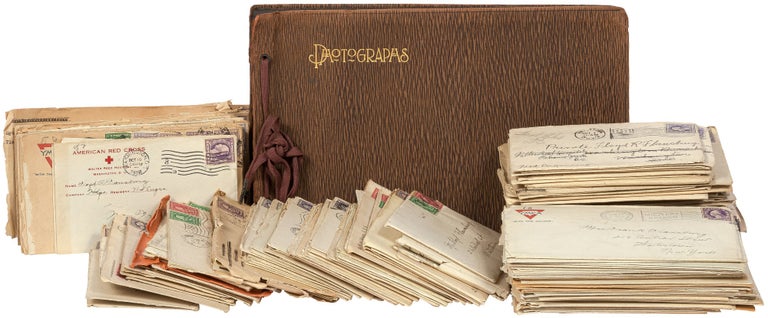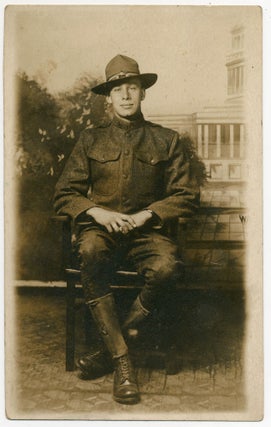[Various locations including Washington, DC; Watertown, New York: mostly 1918].
Sold
Hardcover. An archive of 99 letters written by World War I soldier Floyd R. Flansburg totaling approximately 20,000 words written while on active duty, along with a manuscript journal; dozens of service related documents and pieces of ephemera; 17 letters written to Flansburg from fellow soldiers on active duty; and approximately 125 letters and cards addressed to Flansburg from friends and family. Also included is a single oblong quarto photograph album. String-tied leather wrappers with gilt title to the front. 160 black and white gelatin silver photographs adhesive mounted to rectos of black paper leaves (approximately 26 service images, the remaining are of family and friends). Correspondence is generally very good or better with most of the letters in original mailing envelopes. Album with several disbound pages, though well-preserved. Contents generally very good or better overall.
A thorough written and visual archive of domestic service during World War I compiled by Sgt. Floyd R. Flansburg of Watertown, New York. Flansburg served with the search light division of the 71st Engineers in Washington, DC, and the archive includes detailed accounts of his training in search light operation and maintenance. Highlights include dozens of service photographs; a letter describing his presiding over the operation of search lights on November 11, 1918 at the White House as part of President Wilson's official announcement of the Armistice, along with the original printed duty roster from the operation; and nine letters on the October 1918 flu outbreak in Washington and his time spent in Walter Reed Hospital.
Flansburg’s service correspondence begins with 13 letters from Camp Forrest, Georgia, written between August 22 and September 5, 1918 where he is initially placed with Company D of the 214th Engineers and trained to lead soldiers in drills and demonstrations. During this time, en route to a day trip to Chattanooga, Tennessee, he gives a brief description of the German Prisoner of War camp at Fort Oglethorpe, Georgia: "Coming here we passed a German prison camp with 5,000 inmates. There are three wire fences each ten feet high and a guard every little way's" (August 31, 1918).
Additionally, an original, printed duty roster for the Company is also included. He is assigned to the 71st Engineers, stationed at Washington Barracks in DC, where 74 letters are dated between September 7 and December 9 and documenting his time spent training as a search light operator: "I am enclosing a picture of one of the big trucks that we have here. It has a thirty-six inch light on the back but the picture doesn't show it very good. The extra front that you can see is the electric generator. You can see three other trucks on the right which we use here. We expect another ten ton truck here tomorrow to pull two great trailers upon which are loaded the search light a great four cylinder motor and all the machinery needed to operate the lights. It sure is some outfit and will be some job to keep it in order" (September 30, 1918). This photograph is included in the album.
Washington experienced the flu pandemic in the Fall of 1918 where it killed 2,800 and sickened more than 30,000. Flansburg was stricken with the flu and wrote nine letters detailing his condition, quick recovery, and treatment at Walter Reed Hospital: "Well as you can see I landed up in the hospital with the condemned influenza. Now be sensible and don't worry. When the Doctor examined me a few minutes ago he said that there were no complications. My lungs were sore Wednesday night but I used that atomizer until I drove away all suggestion of soreness. I haven't the least fit of cough and the only way I feel bad is my legs ache like a tooth-ache and my eyes and head are pretty sore from the aching they got yesterday. When I went to the infirmary this morning I had a temperature of 102 and still have a fever but I expect that it will be gone tomorrow" (October 3, 1918).
Flansburg leaves Washington for Camp Humphreys (now Fort Belvoir) in Alexandria, Virginia in December and from there spends a few days at Camp Upton in Brooklyn before being discharged and returning home to Watertown in late December. Dozens of service documents and many pieces of Watertown ephemera are presented in the archive, as well as a group of 13 letters written while undergoing surgery at the V.A. Hospital in Bath, New York, March-April 1938. This archive represents a rich account of domestic service during WWI with uncommon content on search light operations and the city of Washington during wartime.
Item #405154



